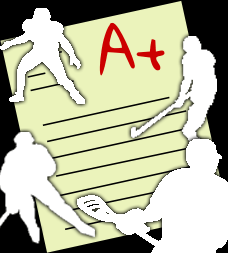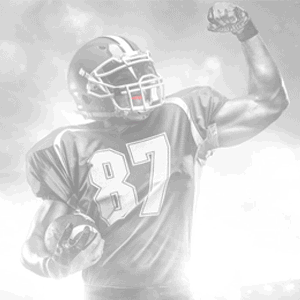Should Student-Athletes Have To Make The Grade To Compete?

A common argument against paying college athletes is that they’re already receiving payment in the form of a free education. However, that argument is a bit flawed — mostly because athletics oftentimes trump academics.
It’s no secret that student-athletes, particularly those in high profile high school and collegiate programs, more-or-less get a pass academically. Whether it’s through easier classes or professors who choose to look the other way, star athletes frequently get preferential treatment so they remain star athletes.
Though that may be unethical, it is reality. Even worse, according to the NCAA, the percentage of high school and college athletes who go on to have professional careers is less than one percent. That means the vast majority of these athletes enter a workforce likely underprepared for the challenges ahead.
Yet still, athletes at all levels — from pee wee to college — have aspirations of making it the big leagues, and those with talent are enabled to pursue their dreams. While talented players should be encouraged to follow their path, academics should not be overlooked.
Which raises the question: should athletes be held to an academic standard in order to compete? And how high should that standard be set?
A Great Price
With six different styles to choose from, there is a perfect Gladiator waiting to lead you into battle starting at $45.
No matter what level they’re at, athletes are often regarded as role models. So, what does it say to the other students when a star athlete is allowed to play in the state championship game, even though they never attend class and their subpar GPA is keeping them from getting into college?
Someone with the talent of Boobie Miles, of Friday Night Lights, wasn’t successful in the classroom but was good enough on the field to warrant scholarship offers at top college programs. In the film, he even said, “Hey, there’s only one subject: It’s football.”
Oftentimes, athletes like Miles with otherworldly talents possess skills good enough to instantly propel them into a professional career, thus choosing to forgo college, even if they are good students. But does that set them up for failure down the road? Is it right that we allow our athletes to focus so much of their energy on something other than their education?
Of course, whether athletic or not, not everyone is a good student. Some people simply excel in other areas than the classroom, and athletics pose a much greater value to a student-athlete than just a professional career. Sports certainly teach teamwork and work ethic, discipline and sportsmanship, and many other important life skills.
These athletes could be using their athletic talents in high school to help them move into a high quality college or university. So maybe there is a benefit in allowing athletes to keep competing, whether they do well in school or not. After all, no one should be cut off from a lifeline they desperately need, as players who don’t identify with school may identify with sports.




 A common argument against paying college athletes is that they’re already receiving payment in the form of a free education. However, that argument is a bit flawed — mostly because athletics oftentimes trump academics.
A common argument against paying college athletes is that they’re already receiving payment in the form of a free education. However, that argument is a bit flawed — mostly because athletics oftentimes trump academics.

Professional athletes who come from the college ranks and receive enormous paychecks also have a considerable influence on our society. So much so that they change national anthems to reflect their political and societal views. They also can threaten our whole economy with a walkout or boycott. Bet that is why the NFL caved.
Love this article! I hate school and evil teachers except for PE. Down with the academics!